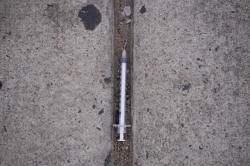|
 Trump
panel urges more treatment options to fight opioid
crisis Trump
panel urges more treatment options to fight opioid
crisis
 Send a link to a friend
Send a link to a friend
[November 02, 2017] By
Toni Clarke
(Reuters) - A panel convened by U.S.
President Donald Trump to tackle the opioid crisis called on Wednesday
for more treatment programs, tighter prescribing guidelines and
additional drug courts to help reduce overdose deaths.
|
|
 The commission, led by New Jersey Governor Chris Christie, said the
recommendations would require funding by Congress but did not
recommend an amount. Trump last week declared the opioid crisis a
public health emergency. The commission, led by New Jersey Governor Chris Christie, said the
recommendations would require funding by Congress but did not
recommend an amount. Trump last week declared the opioid crisis a
public health emergency.
Public health experts broadly welcomed the proposed measures.
"This sounds to me like a very progressive and very needed move,"
said Professor Kosali Simon, a health economist at Indiana
University, of the recommendations.
But Paul Hanly, a New York lawyer representing local governments in
a legal battle against opioid makers, said recommendations, while
laudable, would be "toothless" without substantial funding.

Opioids include prescription painkillers, heroin and fentanyl. More
than 100 Americans die daily from overdoses, according to federal
data.
The commission recommended a national media campaign to encourage
opioid addicts to seek help. Only 10.6 percent of people who need
treatment get it, the report noted.
The media campaign would encourage addicts to "stop being afraid or
ashamed of seeking help when facing their addiction."
It urged expansion of drug courts, in which addicts convicted of
non-violent offenses are diverted into programs that combine
treatment with mandatory drug testing and court appearances.
The commission said drug courts, which are currently offered in just
44 percent of U.S. counties, should embrace medication-assisted
treatment to improve outcomes.
[to top of second column] |

The U.S. Food and Drug Administration last week announced plans to
encourage wider use of substitute opioids such as methadone and
buprenorphine, which do not induce a high and are used to help
people through drug addiction recovery.
Still, Dr. Stefan Kertesz of the University of Alabama at Birmingham
said communities often lack treatment facilities where drug courts
can send addicts. And many drug courts charge fees that make them
unaffordable for many.
"Drug courts often function as pay to play," Kertesz said. "Only
people who can come up with money can escape a prison sentence."
The report recommended expanding the ranks of emergency responders
allowed to administer naloxone to treat overdoses. It also
encouraged stricter prescribing guidelines for physicians.
(Reporting by Toni Clarke in Washington; Editing by Cynthia Osterman)
[© 2017 Thomson Reuters. All rights
reserved.] Copyright 2017 Reuters. All rights reserved. This material may not be published,
broadcast, rewritten or redistributed.
 |